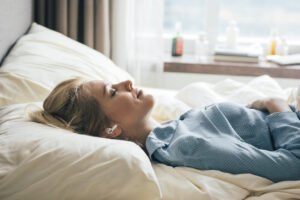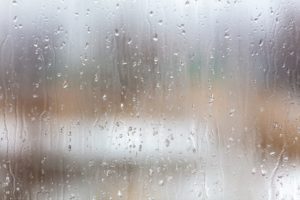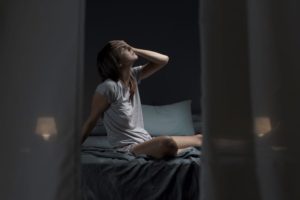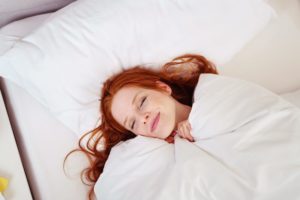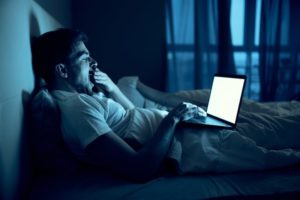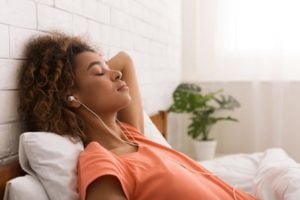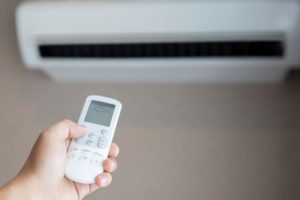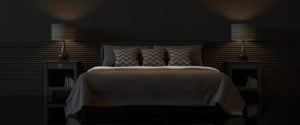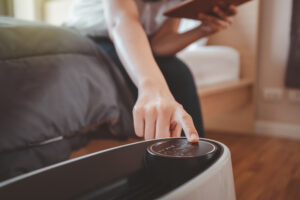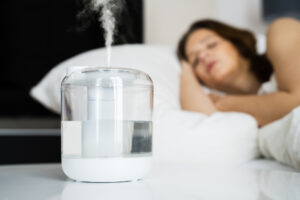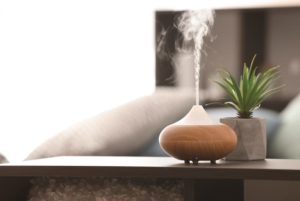Why Am I Shivering or Sweating at Night?
- Disrupted thermoregulation can also disrupt getting a full night of rest.
- Medical conditions as well as changes to your hormones and sleep environment can cause shivers and sweats during sleep.
- Manage nighttime discomfort by adjusting your bedroom temperature and consider changing your mattress, bedding, or sleepwear to improve your situation.
- Speak to a doctor about shivering or sweating if concerned about an underlying condition.
Temperature is an important part of circadian rhythm. Our body temperature undergoes a daily cycle that correlates with sleep-wake patterns. We experience a natural reduction in core body temperature during the hours leading up to bedtime, and this continues after we fall asleep. At the same time, skin temperature increases before and during sleep. Throughout the night, our bodies engage in thermoregulation, which involves physical processes that maintain our body temperature within a narrow range. If we are too cold, shivering helps to warm us up. If we are too warm, sweating releases heat.
Sometimes, the balance between hot and cold is thrown off to the point where these thermoregulation processes cause us to wake up. However, shivering and sweating are sometimes unrelated to thermoregulation; instead, they may be the result of another underlying cause.
Is Your Troubled Sleep a Health Risk?
A variety of issues can cause problems sleeping. Answer three questions to understand if it’s a concern you should worry about.
Causes of Shivering at Night
If the temperature in your bedroom is too cold, or if you aren’t covered by enough clothing or blankets, you may wake up shivering during the night. Other possible causes include:
- Infection: Fevers are the consequence of an immune system reaction to an infection, including bacterial and viral infections. Chills are often associated with fever, and are due to muscle contraction and relaxation, which raises the body’s core temperature.
- Menopause: Menopause is when a woman stops menstruating permanently. The transition to menopause involves hormonal changes that often cause symptoms, including cold chills , which may happen on their own or may occur after a hot flash.
- General anesthesia: General anesthesia is used to put patients to sleep during surgery so that they do not feel pain. Shivers after general anesthesia have been reported in anywhere from 20 to 70% of patients , and are often due to low body temperature.
- Drug withdrawal: Withdrawal symptoms can occur when stopping or reducing use of a drug. Cold flashes with goosebumps are a possible symptom of prescription opioid withdrawal .

Causes of Sweating at Night
Sleeping in a bedroom that is too warm, wearing too many layers, or covering yourself with too much bedding can cause you to sweat at night. There are a number of other potential causes of night sweats:
- Infection: Bacterial and viral infections often cause fevers, and sweating frequently occurs with a fever.
- Menopause: The most common symptom of menopause is hot flashes, which can occur at night and cause night sweats. In the premenopausal state, hormonal fluctuations during certain periods of the menstrual cycle can also lead to night sweats.
- Medications: Some drugs increase sweating as a side effect, including certain antidepressants, opioids, and cancer treatment drugs. Also, withdrawal from drugs, such as opioids , can cause sweating.
- Obstructive sleep apnea: A research study found that up to one-third of individuals with obstructive sleep apnea experience frequent night sweats. An association between other sleep-related disorders (such as RLS) and night sweats has also been suggested.
- Alcohol: Higher alcohol use has been correlated with night and day sweating. Additionally, sweating is a known symptom of alcohol withdrawal .
- Anxiety: Research suggests that panic attacks may be associated with night sweats.
Other causes of night sweats include cancer , acid reflux , hyperthyroidism obesity, low blood sugar, and other infections, such as tuberculosis and HIV.
How To Stop or Reduce Shivering and Sweating While Asleep
For people who have a known cause of their nighttime shivering or sweating, the treatment should focus on the underlying condition. If you are unsure of the cause of your nighttime shivers or sweats, try taking the following steps to see if they help.
- Adjust your bedroom temperature: Evidence suggests that the optimal room temperature for sleep is around 65 degrees Fahrenheit. Each person’s temperature needs are different, though, so it could help to see whether increasing or decreasing the temperature of your room helps relieve your nighttime shivering or sweating. Also consider whether you have the best mattress and bedding for temperature regulation, as these are things that can impact body temperature throughout the night.
- Experiment with layers: If you are shivering at night, try adding more layers of clothing, including socks, or blankets. If you are sweating, remove layers and wear loose, breathable clothing to bed.
- Use a fan or heat pack: Placing a fan in your bedroom can help cool you off, while bringing a hot water bottle or heating pad with you to bed can keep you warm.
- Check for fever: Take your temperature, and if you find that you have a fever, you may have an infection. Drink fluids and rest at home. A sponge bath with lukewarm water may help relieve fever symptoms. Fever-reducing medications are also available over the counter.
Is This Dangerous? When Should You See a Doctor?
In most cases, nighttime shivering or sweating is not dangerous and is not cause for alarm. If your symptoms occur often or do not resolve with changes in your bedroom temperature and bedding, it’s a good idea to speak with your doctor. Your doctor will collect information from you about the frequency and severity of your shivering or sweating, along with other related symptoms. Your doctor may also recommend diagnostic testing to diagnose or rule out an underlying condition.
If you have chills and night sweats due to a fever, make sure to speak with a doctor if your temperature reaches 103 degrees Fahrenheit, if you have a fever lasting longer than three days, or the fever is associated with symptoms such as headache, stiff neck, chest pain, rash, or severe throat swelling.

Still have questions? Ask our community!
Join our Sleep Care Community — a trusted hub of sleep health professionals, product specialists, and people just like you. Whether you need expert sleep advice for your insomnia or you’re searching for the perfect mattress, we’ve got you covered. Get personalized guidance from the experts who know sleep best.
References
13 Sources
-
Harding, E. C., Franks, N. P., & Wisden, W. (2019). The temperature dependence of sleep. Frontiers in Neuroscience, 13, 336.
https://pubmed.ncbi.nlm.nih.gov/31105512/ -
A.D.A.M. MedicalEncyclopedia. (2019, February 7). Chills., Retrieved October 14, 2020, from
https://medlineplus.gov/ency/article/003091.htm -
Office on Women’s Health. (2017). Menopause symptoms and relief., Retrieved October 14, 2020, from
https://www.womenshealth.gov/menopause/menopause-symptoms-and-relief -
Lopez M. B. (2018). Postanaesthetic shivering – from pathophysiology to prevention. Romanian journal of anaesthesia and intensive care, 25(1), 73–81.
https://pubmed.ncbi.nlm.nih.gov/29756066/ -
National Institute on Drug Abuse. (n.d.). Commonly Abused Drugs and Withdrawal Symptoms., Retrieved October 14, 2020, from
https://www.drugabuse.gov/sites/default/files/nida_commonlyabused_withdrawalsymptoms_10062017-508-1.pdf -
Cheshire, W. P., & Fealey, R. D. (2008). Drug-induced hyperhidrosis and hypohidrosis: incidence, prevention and management. Drug safety, 31(2), 109–126.
http://link.springer.com/10.2165/00002018-200831020-00002 -
A.D.A.M. Medical Encyclopedia. (2018, May 5). Opiate and opioid withdrawal., Retrieved October 14, 2020, from
https://medlineplus.gov/ency/article/000949.htm -
Arnardottir, E. S., Janson, C., Bjornsdottir, E., Benediktsdottir, B., Juliusson, S., Kuna, S. T., Pack, A. I., & Gislason, T. (2013). Nocturnal sweating–A common symptom of obstructive sleep apnoea: The Icelandic sleep apnoea cohort. BMJ Open, 3(5), e002795.
https://pubmed.ncbi.nlm.nih.gov/23674447/ -
Mold, J. W., Mathew, M. K., Belgore, S., & DeHaven, M. (2002). Prevalence of night sweats in primary care patients: An OKPRN and TAFP-Net collaborative study. The Journal of Family Practice, 51(5), 452–456.
https://pubmed.ncbi.nlm.nih.gov/12019054/ -
O’Malley, G. F., & O’Malley, R. (2020, May). Merck Manual Professional Version: Alcohol Toxicity and Withdrawal., Retrieved October 14, 2020, from
https://www.merckmanuals.com/professional/special-subjects/recreational-drugs-and-intoxicants/alcohol-toxicity-and-withdrawal -
National Cancer Institute. (2019, May 16). Symptoms of Cancer., Retrieved October 14, 2020, from
https://www.cancer.gov/about-cancer/diagnosis-staging/symptoms -
Mold, J. W., Woolley, J. H., & Nagykaldi, Z. (2006). Associations between night sweats and other sleep disturbances: An OKPRN study. Annals of family medicine, 4(5), 423–426
https://pubmed.ncbi.nlm.nih.gov/17003142/ -
Viera, A. J., Bond, M. M., & Yates, S. W. (2003). Diagnosing night sweats. American family physician, 67(5), 1019–1024.
https://pubmed.ncbi.nlm.nih.gov/12643362/



